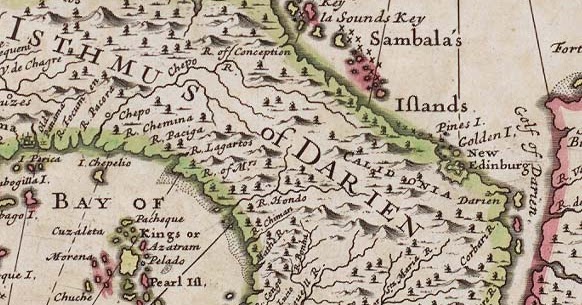14 May 2020 | OPINION
Almost 322 years after a group of Scotsmen placed a saltire in New Edinburgh, a group of Scottish nationalists are attempting to take the nation on a second Panamanian trip. This trip, akin to the first, would eviscerate the economic standing of an entire nation. However, whilst the former resulted in the eventual acceptance of the Act of Union either side of Berwick, the latter may be a direct consequence of its collapse.
Whilst the entirety of the British Isles is currently focusing on the coronavirus pandemic, the question of Unionism and the Britishness of the kingdom’s Celtic corners will rise again once the crisis has abated.
It is little under a year until the people of Scotland will go to the polls and elect the 129 Members in Holyrood. Whilst the recent formation of the ‘Independence for Scotland Party’ is extremely recent, nobody is yet able to estimate the success of the party in a future devolved election.
The election of 2021 has been considered a central point in Scotland’s road for a second independence referendum. Initially, Unionists may rejoice in the prospect of the nationalist vote splitting. On further inspection, however, it appears the new party has made a calculated move to ensure that a majority of Members in Holyrood can pass a second independence referendum bill.
The leader of this party, Colette Walker, made clear that the party would not contest constituency seats against the Scottish National Party, but would contest the 57 regional seats in order to defeat the Unionist parties.
If the people of Scotland were to vote for a pro-independence majority, then the question over Scotland’s economic future would arise once more. Based on the current economic arguments made by Scottish separatists, the notion of Scottish sovereignty would be compromised.
No matter what decisions were taken – either in monetary union with London, or in the lengthy and tentative application for membership of the European Union – the people of Scotland would suffer profound consequences.
In the build-up to the so-called ‘Brexit Election’, David Linden, the Member of Parliament for Glasgow East, reiterated that the SNP supported Scotland’s continued use of the British pound sterling, even if the nation voted to leave the political institutions.
However, ‘sterlingisation’ would leave the economic pillars of Scotland even more attached to Threadneedle Street than it is already. In what can only be described as similar to a ‘Brexit in Name Only’ agreement, a monetary union would place a straitjacket upon Scotland to the same extent as applying to re-join the European Union would. Instead, staying a part of the representative union of equals would enable Scotland to bargain for monetary alterations to the benefit of the 5.5 million Scotsmen and women north of the border.
A monetary union would leave Scotland with an almost identical relationship to the one that Panama has with the United States of America. A relationship that would bind Scotland to any interest rate percentage authorised from the central bank of the United Kingdom. A relationship that would prevent Scotland from printing additional pound notes without the consent of London. And a relationship that would therefore make this experiment as risky and irresponsible as the journey made by the Company of Scotland during the Darien scheme.
But what alternatives do separatists champion? Joining the empirically disastrous Eurozone? Or creating a new Scottish currency and forcing the nation into decades of uncertainty? Either of these plans, during a time that has seen oil prices collapse and when intra-British trade – which continues to create prosperity across all four corners of the United Kingdom – would be put at risk, would place the Scottish economy in an unprecedented time of insecurity.



























[…] would focus on the intricate details of this debate. The SNP would be forced to come clean on what currency an independent Scotland would use and the potential construction of 21st century Hadrian’s […]
[…] would focus on the intricate details of this debate. The SNP would be forced to come clean on what currency an independent Scotland would use and the potential construction of 21st century Hadrian’s […]
Jack,
Your argument seems logical but lacks real economic rigour. Darien was the brainchild of wealthy grandees- independence would be democratic- voted upon by all of Scotland’s people. Rule by grandees no longer applies in the Scottish chamber of Government- unlike the bicameral chambers of Westminster. Darien left Scotland ripe for effective acquisition by England. Union was undoubtedly the best thing for Scotland at the time. English control pacified a very factional Scotland and imposed law and order. This in turn created the conditions for unprecedented economic growth and the Enlightenment- which had a huge impact upon all of the western world.
Time has however moved on. Post Brexit Great Britain may no longer be the ideal combination of talents, resources and economic levers it once was. Scotland is extraordinarily rich in resources- not least of which are the Scots. As Eurovision (the only international plebiscite we have to gauge this by) demonstrated yet again the UK is reviled. It is inarguable that a post independence Scotland would enjoy favoured nation status among our fellow Europeans. That in turn would generate an economic bounce. Once back within the European fold (and Germany and France have already indicated this would be fast- tracked) Scotland becomes very, very attractive for financial services (within the EU, English speaking, good at financial services). Also Scotland remains a good entrepôt for international trade.
You dismiss the Euro out of hand. I wouldn’t- I see no reason, post rejoining Europe to retain the pound- other than silly jingoism and sentiment. So only the interim currency is open to question- and England would be cutting off its nose to spite its face if it didn’t enable that. Just like Boris and Europe I’m sure we’d all stay the best of friends!